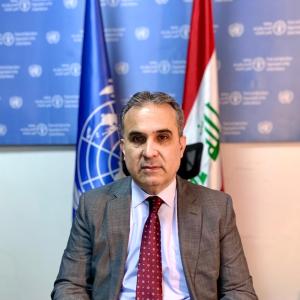Supporting 3,580 rural women in Basra, Maysan and Thi Qar with dairy value chain development equipment
19 February 2025
Basra/Maysan/Dhi Qar, Iraq, Monday, February 18, 2025
The Food and Agriculture Organization of the United Nations (FAO) in Iraq, in collaboration with the Ministry of Agriculture and local partners, launched a new series of equipment distribution ceremonies for dairy value chain development to support rural women in southern Iraq, within the EU-funded project “Restoring and Strengthening the Resilience of Agri-Food Systems in Southern Iraq”.
During the celebrations, the new equipment was distributed in the governorates of Maysan, Dhi Qar and Basra, in the presence of the Technical Undersecretary of the Ministry of Agriculture, Dr. Mithaq Al-Khafaji, FAO Representative, Salah ElHajj Hassan, representatives of the Ministry of Planning, the Women Empowerment Department of the Iraqi Council of Ministers, the Director General of the Department of Environmental Protection and Improvement in the Southern Region, the local governments, and a number of female farmers.
Empowering Rural Women
The dairy value chain development equipment to support rural women in southern Iraq will empower 3,580 rural women in the dairy sector in the three governorates, with 1,180 rural women in nine administrative units in Maysan Governorate, 1,250 rural women in three administrative units in Basra Governorate, and 1,150 rural women in two administrative units in Dhi Qar Governorate. The women will use the equipment to transport and store approximately 160,000 liters of milk per day.
“These activities are part of broader efforts to empower 25,834 rural households in Basra, Dhi Qar, and Maysan, where women make up the majority of beneficiaries, which contributes to achieving significant development in improving the quality of milk and dairy products, increasing production, and economically empowering rural women, which enhances food security and opens new horizons for sustainable development in southern Iraq,” said Salah ElHaj Hassan during the ceremony.
“Supporting and empowering rural women by providing them with the necessary skills and modern equipment to produce dairy products and other small agricultural projects through FAO, contributes significantly to enhancing food security efforts in Iraq, and leads to improving the economic conditions in rural communities and creating more job opportunities. We are pleased to cooperate with FAO in such efforts within deep and long-term partnership,” said Dr. Mithaq Al-Khafaji, Technical Undersecretary of the Ministry of Agriculture.
The FAO-EU-funded project entitled “Restoration and Strengthening the Resilience of Agri-food Systems in Southern Iraq” is being implemented in collaboration with the Ministry of Agriculture and local partners. This initiative aims to support smallholder farmers and communities in adapting to climate challenges while improving agricultural productivity and livelihoods.
For more information, please contact:
Reem AlSadoon/ FAO Iraq Communications Assistant
Dr.Salah ElHajj Hassan/ FAO Iraq Representative

He started his career in 1984, as Senior Research Assistant in the Agricultural Research and Education Centre (AREC), American University of Beirut. From 1987 to 1991, he was Coordinator of the Student Training Programme, and also Agriculture and Horticultural Teacher for the Faculty of Agriculture, at the Lebanese University.
From 1991 to 1995, he worked as Agricultural Engineer at the Ministry of Agriculture, Bekaa Regional Office, Zahlah and was then assigned to the Agricultural Research Institute in the Tal Amara station, first as Head of the Crop Production Department and subsequently in charge of the Plant Protection Laboratory. From 2002 to 2006, he was Director of the Kfardane Research Station (Agricultural Research Institute). In 2008, he became Visiting Scientist at the International Maize and Wheat Improvement Centre (CIMMYT) and Coordinator of a project with the International Centre for Atomic Energy Agency, Vienna.
In 2010, he served as Advisor to the Minister for Agriculture of Lebanon. In 2011, he became President of the Pesticide Scientific Committee, Head of the Phytoplasma Committee and Director of the Agriculture and Rural Development Programme (ARDP) (EU-funded project). From 2010 to 2013, he represented Lebanon in negotiations with EU, Egypt, Jordan and Iraq. During his career, Mr Hajj Hassan also carried out a number of other functions. He represented the Lebanese Agricultural Research Institute (LARI) in several research programmes with the International Centre for Agricultural Research in the Dry Areas (ICARDA) and the American University of Beirut. He was Coordinator of the Mashreq/Maghreb project with ICARDA, representing Lebanon in the Steering Committee, as well as being the Head of the Sugar-beet Delivery and of the Wheat Delivery Committees. For a number of years, Mr Hajj Hassan worked for the preparation of FAO TCP projects and served as the National Director of a TCP project. He joined FAO in January 2014 as FAO Representative in Yemen. Mr Hajj Hassan succeeds Mr El Zubi as FAO Representative in Iraq.




